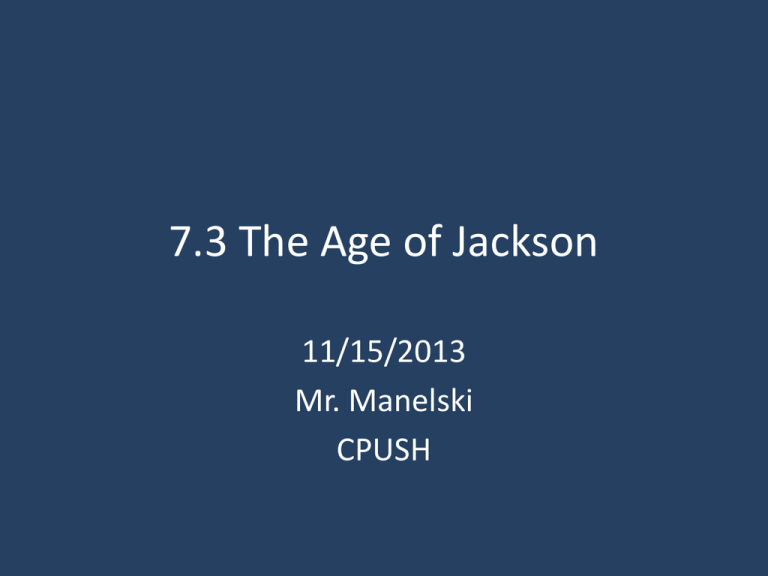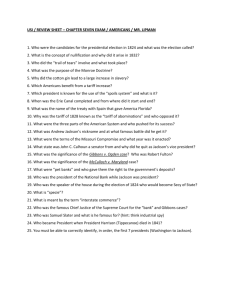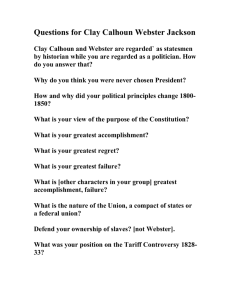7.3 The Age of Jackson
advertisement

7.3 The Age of Jackson 11/15/2013 Mr. Manelski CPUSH OBJECTIVES • OBJECTIVES: IDENTIFY the events and factors that contributed to Andrew Jackson’s rise to power. • DESCRIBE Andrew Jackson’s political beliefs. • EXAMINE how Jackson’s presidency expanded democracy and egalitarianism, but not to all Americans. The Era of Good FeelingsReally? • Election of 1816: Republicans crush Federalists, 183 to 34 (see election.org) • James Monroe is 5th President of the United States • Monroe is the ambassador of Nationalism • Monroe’s administration was called the “Era of Good Feelings” WHY? ANSWER: With no Federalists, the US seemed united The Election of 1824: A Corrupt Bargain? • Andrew Jackson wins popular vote – 38% – Running against John Quincy Adams, William Crawford, and Henry Clay • Jackson and Adams tie in the Electoral College – Clay comes in last and drops out – Crawford has a stroke and drops out • Clay is also the Speaker of the House – Why is this important? * Remember in the case of a tie Congress votes and decides the election “The Corrupt Bargain” The Facts of the Case: 1. 2. 3. 4. 5. 6. 7. “The Corrupt Bargain” THE FACTS OF THE CASE: 1. Election of 1824 2. Andrew Jackson wins popular vote 3. Jackson and John Quincy Adams tie for electoral vote 4. Henry Clay, Speaker of the House, to decide the tie 5. Clay meets with Adams privately 6. Clay gives Adams the Presidency 7. Adams makes Clay Secretary of State The Administration of John Quincy Adams • The undiplomatic diplomat, the apolitical politician • First “minority president” • Refused to remove officeholders or use patronage • Urged nationalistic endeavors on Congress • Increasingly out of step with growing sectionalism • Viewed positively by history, not so in his day Jackson Wins in 1828 • • • • • • • Democratic-Republicans (Jackson) divorces from Nationalistic-Republicans (Adams) “Shall the people rule?”- expansion of suffrage Jackson runs as a “reform” candidate Mudslinging, personal attacks on J.Q. Adams Jackson wins 178 to 83, wins West and South Shift of power, East to West, Elite to Common Man Data Visualizations • Following the Frontier Line The Jackson Administration • • • • • • • Individualism, Opportunism, Versatility, Populism Orphaned & Uneducated Became Judge and Congressman for Tennessee “Old Hickory” to his troops 1st President from West, 2nd w/o College Degree Suspicious of Clay’s American System Frequently uses veto power, “King Andrew” First Inaugural Address of Andrew Jackson WEDNESDAY, MARCH 4, 1829 (Excerpt) The recent demonstration of public sentiment inscribes on the list of Executive duties, in characters too legible to be overlooked, the task of reform, which will require particularly the correction of those abuses that have brought the patronage of the Federal Government into conflict with the freedom of elections, and the counteraction of those causes which have disturbed the rightful course of appointment and have placed or continued power in unfaithful or incompetent hands. In the performance of a task thus generally delineated I shall endeavor to select men whose diligence and talents will insure in their respective stations able and faithful cooperation, depending for the advancement of the public service more on the integrity and zeal of the public officers than on their numbers. “Spoils System” • Large #’s of Jackson supporters rewarded with federal jobs, “rotation in office” • Removes 10% of officeholders • Party membership vs. Merit &Service • Increased corruption: “Kitchen Cabinet,” • Increased power of party machines In your opinion, was Jackson himself was a man “of the people”? (HINT: look at “Key Player” pg. 211) How did the Election 1824 shape Jackson’s political beliefs & his “spoils system?” Nullification Crisis • Tariff of 1816 increased twice: 1824 & 1828 • John C. Calhoun – “The Tariff of Abominations” 1828 – The South Carolina Exposition – States had the right to nullify or ignore federal laws they don’t agree with • Should be able to leave union if they can’t – Calhoun saw it as majority trampling on the minority- New England getting rich at the expensive of the South • John C. CalhounJackson’s Vice President Hayne and Webster Debates • • • • • When: January 1830 Who: Robert Hayne of SC and Daniel Webster of MA What: Debated role of Federal Gov & States Rights Where: US Senate Why: Showed the increased sectionalism. Haynes believed that states had the right to follow the laws they wanted to or leave Union. Webster was for Union / Nationalism. • Jackson weighs in- “Our Union- It must be preserved” – Calhoun and Jackson never work together again Daniel Webster on the Senate floor Webster- Haynes Debate Tariff of 1832 • Congress Passes another Tariff in 1832 • South Carolina declares? – Tariff unconstitutional – “null, void, and no law” – Threatened to secede, or leave union • How does Jackson react? – Takes personal offense to it – Threatens to send federal troops into South Carolina, hang Calhoun – Congress passes Force Bill • Authorized federal gov to use military against SC • Henry Clay steps in and arranges compromise between all groups Videos • Nullification Video • Nullification Video 2 Start at 1:40







